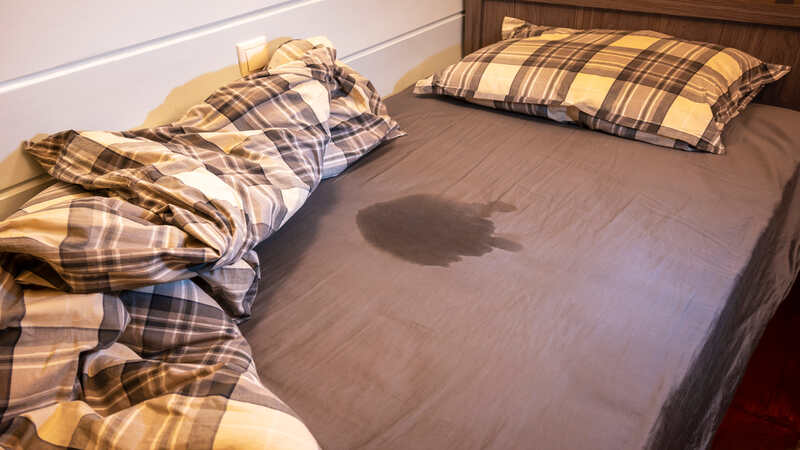
Often kids who wet their bed are mocked and teased at and sometimes they even have to face the wrath of their parents. What most people fail to understand is that bed-wetting is not a habit or a sign of laziness, but is more of a developmental issue.
What Is Bed-wetting?
Bed-wetting is when a child or an adult involuntarily urinates in his sleep. As the child grows he learns to control his or her bladder and outgrows bed-wetting gradually but some children may continue to wet their beds even at the age of 7- 12. It so happens because their brain does not send out the signal to control the urine in the bladder but involuntarily empties the same just as it did when the child was a baby. This is when you need to take certain measures to help the child.
Bed-wetting can be a serious blow to a child’s self-esteem and confidence, and parents should understand that bed-wetting is more like a neurological problem, hence shaming or punishing a child would do no good. Instead, it will only be regressive and the treatment will take even longer.
Causes Of Bed-wetting In Children
Bed-wetting is caused by many factors. One of them is slow paced development of bladder control. In some children bladder development is a little slower compared to others. It is nothing to worry about it just means that your child will take a little longer to overcome this issue as compared to other kids. Most of the time bed-wetting is hereditary. If a parent or a relative suffers or had suffered from bed-wetting chances are that the child has inherited it. Other reasons for bed-wetting could be urinary infection, stress or poor toilet habits. Stress, a new baby in the house, relocation and other such issues could also cause bed-wetting in kids. Read more about them here.
8 Tips To Treat Bed-wetting In Children
-
- Eating and drinking habits: Your child’s bed-wetting could be because of his eating habits. If after the age of 7 your child still faces bed-wetting issues the first step you could take is to monitor his fluid intake. Schedule your child’s diet so he drinks his juices and soups in the morning. Make sure you give him solid food before the bedtime and avoid liquids as much as possible
- Toilet training: Sometimes, kids are so engrossed in playing or watching cartoon that they tend to hold their urine and bowels. Making sure your child goes to the washroom at regular intervals is important. This will help with the development of bowel movements and regularly emptying his bowels will reduce the chances of bed-wetting. Also make sure your child uses the washroom before going to bed. Another tip would be to wake your child up 3-4 hours later and take him to the washroom
- Include the child in the cleaning process: The child needs to understand that bed-wetting is not normal and including him in the cleaning process will help him to understand this. Do not make him do the rigorous stuff like washing and scrubbing ; it might seem like punishment to him and affect him negatively. Take his help to do the small chores like removing the sheets, drying them etc. However, do not humiliate him else the problem will increase
- Reward your child: Rewarding a child or giving him an incentive to do better in future always works. On days when your child doesn’t wet the bed make sure you reward him. A good activity would be to give him a sticker or a candy as encouragement. This will not only put the child in a positive state of mind but it will also encourage him to control his bladder and empty it as the urge strikes
- Moisture alarms and other products: Fortunately now days there are a lot of products available in the market to help treat bed-wetting and also to ease the cleaning-up process. Moisture Alarms are very popular in western countries and now they are available in India as well. They trigger an alarm and wake up the child when the moisture level in the room increases. To make things easier for yourself as well, you could opt for sheets and bedding made especially for bed-wetters
- Talk to the doctor: If you think that your child’s bed wetting habit is more than just slower bladder control, do not hesitate to consult a doctor. In worst case scenarios bed-wetting can be caused because of emotional imbalance and neurological defects or the child may even suffer from diabetes but with proper medication it can be healed. This way any underlying health problem will be ruled out and necessary treatment can begin. Do not feel embarrassed to discuss the same, and even if the doctor does not ask about it at regular health check ups, bring up the issue yourself
- Prescribed medication: After doing medical checkups when you are assured that your child is not suffering from a serious illness you could ask your doctor to prescribe some medication for the child’s bed-wetting issue. There are plenty of medicines available in the market to treat bed wetting in children but it is advisable that you consult your doctor before giving your child any medication. Use medications as the last resort and restrict the use
- Be supportive: A child is vulnerable, do not subject him to brutal punishment for bed-wetting. Remember he is not doing it on purpose, bed-wetting is beyond his control. During such situations support and compassion from parents and family can go a long way. Chances are that the child is already nervous and embarrassed about the bed-wetting issue, deal with the situation sensitively and talk to the child. Teasing him or scolding him will impact the child negatively and worsen the situation
Children are quite smart and understanding than what we give them credit for. Your frustration will not do anything positive, but talking calmly would. If the child is himself not very happy wearing night diapers or despises the wet bed-sheets, it indicates he is ready to deal with bed-wetting. Your encouragement will help the child to deal with the situation and stay positive throughout the process of treatment.


